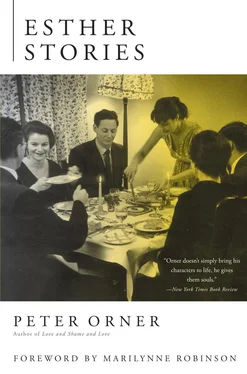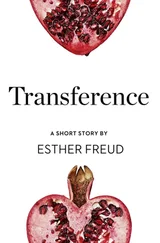“You smell like peaches,” he whispers.
“Nice. That’s nice,” Shirl says, and pulls him toward her. Then she scuttles atop him and jams her breasts into his chest. He squirms. There’s some wet back-and-forthing, but other than that, he feels nothing but the somersault of the room. Shirl’s legs wiggle. She laughs and flounces.
In the morning it takes him a few panicked moments to figure out where he is. That cat glares at him from the floor. She’s made a nest out of Wallace’s coat. The room has no pictures. There is only this cat. Shirl’s knee digs into his thigh. Her mouth is open and her breath is loud and windy. When he gets out of bed, Shirl rolls over but doesn’t wake up. Philip parts the curtains and looks out the window as he buttons his shirt. It’s begun to snow. Tiny flecks pelt the window and turn to water, ride down the pane in streaks.
He watches Shirl and is shocked by the blurry memory that he’d reached for her in the night, in his stupor, and found her drawn away, huddled, wedged to the wall. He’d reached for her. He’d clawed across the sheets for her. It makes him think of his sister, who used to sneak into his room in the middle of the night and sleep under his bed. In the morning he’d wake up to a little hand reaching up, as if from the dead, twisting the skin of his arm. How he used to scream for his mother, and she’d stand in his room and say, “Esther only just adores you.” He looks at Shirl’s muddle of hair across the pillow. Clawed across the sheets for you. He leaves the coat to the cat.
In half an hour Shirl will wake up alone and dress and return to work, where she will type and file and endure Seymour’s gruff another day. Over lunch she will tell her girlfriend Irene from the accountant’s office down the hall about the honcho’s kid. Young, sort of fumbly, shadowed me down to Charlie Boo’s.
But Philip won’t show up for work today. He won’t go home to Lunt Avenue or to his mother, either. Instead, he will roam. Probably not beyond Peterson to the south, or Howard to the north, but for a while at least my father, in shirtsleeves, will roam the slush-brown sidewalks of this city he will never leave.
WHATEVER HAPPENED, it happened the night of April 20, 1960, the night Bunny Hirsch hosted an extravaganza to celebrate her husband Franklin’s two decades in business. The wow years, as he called them. He’d turned a storefront Ashland Avenue dry-goods shop into an empire that stretched the Midwest vertically. Both Dakotas to Cairo, Illinois…People Trust Hirsch Drugs. My grandmother claims it was the grandest hoopla ever thrown in a private house. And the house! One of those American-made castles on the lake side of Sheridan Road, the ones that make you slow down and gawk, amazed that anybody could be so ostentatious in such a cold climate. Theirs was a three-floor Italian palazzo with a tower, the roof of which was pink and looked like an upside-down sugar cone. “Garish,” my grandmother said. “Very very garish.” Both Illinois senators made appearances, along with a babbling cackle of congressmen. Sid Luckman, the old Jewish quarterback, the man everyone wanted their sons to grow up to be, sauntered in with his— shhhhhhhhhhhh —half-black fourth wife. Mayor Daley was there, drinking cranberry juice and rigorously cleaning his ears with his fingers. Suburbia always made him fidgety. My grandmother was so concerned about her hair for the party that she went back to the beauty shop twice to have her wave reset. (“Really, I was never so close to leaving Lamont in my life.”) That night the front hallway was decorated with irises and wild lilies imported, people said, from Baja, California, that morning. And there was Paula. Paula Hirsch had flown in from Colgate for the weekend. She was twenty. A startling redhead. Her hair was so unusually orange that people had often wondered who delivered this girl to Bunny and Franklin’s doorstep in a basket. Paula looked more like an Irish princess (“If there ever was such a thing,” my grandmother said) than the daughter of rumpled, floppy-breasted Franklin, a man who always stood crouched like the army boxer he’d once been. By no stretch of anyone’s imagination was he handsome. Bunny, of course, had been beautiful once, but according to my grandmother, she’d gotten considerably more severe and horsy-looking over the years. Yet their daughter, the ravishing anomaly, glided across the marble tile floors that night proud of her father’s money and her mother’s way with a party. Paula was not, and had never been known to be, a rebellious girl. Guests remembered her greeting them at the door that night as if she were her mother’s twin. She welcomed people with the same flutter. Mrs. Katzenbaum! You could be his daughter! Come in, come in, both of you …She danced, laughed, whispered gossip with the other college girls, including my Aunt Esther. She also drank, ate chocolates, and, as her mother had demanded, circulated.
The story goes roughly like this: At one point, not very late in the party, Paula Hirsch spilled punch on her dress. She’d been in the middle of a conversation with a man who was soon to become famous in the papers. An unknown, at least to Bunny’s set; it came out later that he hadn’t been invited. His name was Isaac Persky and he was the son of a pawnbroker on Garfield Avenue. His father still talked Yiddish. “How that boy got into that party,” my grandmother said, “God only knows.” Later that night, after they arrested him, Persky told police that after the spill Paula excused herself with a playful toss of her head (“How clumsy, be right back”). He said he gave way and watched her disappear into the kitchen, and that, Isaac Persky swore, was the last he saw of her.
“On Fargo Avenue,” my grandmother said. “I was Bernie Shlansky and she was Bunny Eisendrath. Bernie and Bunny. Her real name was Muriel, but her father called her Bunny because she never stopped moving, even in her sleep. The girl wore her favorite rubber boots to bed. We danced together at the Chicago Theater on the North Side, the Tivoli on the South Side, and McVicker’s in the middle. For two years, on school vacations, we traveled with Benny Meroff and his orchestra as part of his dancing girls. I never had a sister. My head on the El tracks for her would have been nothing. She was under the table when Benny Meroff himself stole a kiss from me — God knows why; I was the homely one, especially with my old nose. Anyway, Bunny tried to protect me, even though I didn’t want protection. I liked it. Benny Meroff’s slippery lips. But there she was, leaping up from under the table shouting Fire! fire! fire! like a banshee. She was there the night I pranced onstage at the Oriental without my tights. And she was a hell of a lot better showgirl than I was. Nobody shimmied like her. Could she have gone to New York? Absolutely. But who wanted that? We didn’t want to be discovered. We wanted to be wives in Chicago. (Of course, if anybody at the time had told me the truth about that pursuit…but that’s neither here nor there anymore.) We got married, had children, daughters. Her husband got richer than mine. God knows, you didn’t need to hire an accountant to figure that out. Man got rich as Croesus selling Kaopectate. But I had Esther, and Esther was Esther. Such a doll, nobody’d stop talking about her. A genius at everything she touched. Ballet, piano, violins, the balance beam, even school. Seymour taught her how to shoot, and she won prizes doing that. And Paula Hirsch was Paula Hirsch. Quieter than Esther (but who wasn’t?), much less the little bulldozer. When they were girls, Esther used to boss Paula around. Make her walk the dog while she sat on the grass in bare feet singing bathroom songs. Things like that. Girl so unlike her mother, and it drove Bunny daffy. Finally they sent her away to prep school near Boston. Bunny thought maybe Illinois was the problem. I hardly saw Paula in those years except when she came home for school vacations. But even then she was still so shy, hiding behind that strange red hair, following you with her eyes but not saying one word. I always had the feeling she was somewhere else when her mother was rattling on. You know, Bunny could talk a storm to sleep and not say a single thing worth remembering. I remember — not so long before — Paula had told her she decided to major in botany at college. God, did that have Bunny in hysterics. Her shouting, ‘My only daughter wants to be a florist!’ But at the party, that party of parties, she couldn’t have been more different, and Bunny beamed. Look, Bernice, the girl’s escaped herself. It was there in Bunny’s eyes as she kissed me and pulled me into the house that night. Look at her! Look at my daughter! And then, Lord knows, it happened.”
Читать дальше












